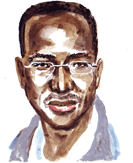

As Doctor Madu Okoye finished advocating what he dubbed The Final Solution to the Unemployment Question, not a leaf stirred, not a bird chirped, and not a lizard crawled across the wall of the remote, incomplete warehouse where the Unemployed Brotherhood was gathered.
The silence was broken by Doctor Okoye's footsteps as he began to pace back and forth before the mass of hunger-scarred faces. He stopped abruptly and locked eyes with the crowd. "They're sit-tights, age-falsifying misappropriates and embezzlers who are bent on ensuring that the God-given largesse of our great nation does not percolate down to us. They're ravenous dams in the flow of goodness to us. But brothers, we can't continue like this. It's time we took destiny into our own hands. Like the Nobel Laureate wrote, the man in us will die if we continue to keep silent in the face of such oppression. How can we continue to live like Israelite slaves when we are not in the Egypt of the Pharaohs but in our very own country? This is the only way, brothers. This is the only way."
Doctor Okoye stopped again and began to stroke the welt of a scar on his left arm, a scar he had acquired during his school days when he led the Blood Brotherhood. This was usually the sign that he had finished speaking.
"But... do you think our conscience will allow us to go that far even in the face of our privations?"
The speaker must have been in his early thirties but he looked fifty. The breast pocket of his threadbare 1960s suit, which hung over his shoulders like a scarecrow's adornment, bulged with copies of his CV and certificates which he now carried about with him wherever he went just in case a job opportunity presented itself.
Doctor Okoye sniggered. "Does a dead man have a conscience?" he asked, looking at the crowd before him. No answer was forthcoming, so he barked, "I asked, does a dead man have a conscience?"
"Nooo!" The crowd answered back. Their tone, though subdued, still carried across enough force.
"No! A dead man has no conscience. One has first to be alive before he can maintain a conscience. And I tell you, brothers, it is our very lives that are at stake here; it is our very existence as humans that is being threatened. Therefore conscience has become a luxury that we can ill afford to keep. How far has keeping our conscience helped us in securing jobs and living as human beings with respect and dignity? What shall we do when they usurp the vacancies and tell us there are no more jobs? Shall we continue to listen to that?"
"Nooo!"
"Shall we go ahead and create the job-spaces for ourselves?"
"Yeeess!"
"Yes. Let's help them create the job-spaces."
"Yeeess!"
"By any means necessary?"
"Yeeess!"
Everyone in the hall was now standing, heads nodding, fists clenched, in a religious frenzy of chanting. The empty cans which had hitherto served as seats had been knocked aside and were lying in disarray. The atmosphere was seething with the frustration of endless years of job-seeking accumulated and handed down over generations. The long-suffering cord of patience was about to snap. This generation was determined not to pass on the baton of their suffering to the next.
Chief Doctor Chukwuemeka Olili slid his feet into his leather slippers and reclined into his swivel chair. It was just past noon and after staying put for about two hours in the office, he felt he had done enough for the day. A wise dancer has to learn to limit the acrobatic twists as she grows older, unless she wants to be carried off the stage with a broken waist.
With an official age of 54, he still had six years remaining in the service, although his actual age at retirement will be 70. At least he did not hope to live very long after that, neither did any of his colleagues, his fellow director-generals and senior officials of the public service. Secretly they joked and called themselves squirrels after an old proverb which says that the tricky squirrel will always show his bushy, bearded face at any occasion where age was at an advantage, and his tiny palms whenever youth would gain favour. He pushed himself up from his seat, squinting as his rheumatic waist protested at the sudden effort. He was getting too old for this. But the benefits accruable from remaining in service far outweighed those of becoming a pensioner. He gathered the folds of his agbada dress and walked towards the adjoining office. "Ada... Ada!" he called to his secretary.
Ada, a petite beauty with large clear eyes, looked up and smiled. The worldly-wise twist of her red lips contrasted with the innocence of her eyes, creating a certain mystique that has enchanted many.
"Sir?"
"Is everything set for the Monday workshop?"
"Yes, sir."
Chief Olili's expression softened and a crooked grin played on his lips.
"And how's this weekend going to be?"
"It's up to you, sir."
"Yes, that's my sweet Shunamite. Meet me on Sunday; usual place, usual time."
"Yes, sir."
"And uh..." Chief Olili reached into the bag he was holding and retrieved a bundle of two-hundred-naira notes. "Take this for your transport, and come in a nice new dress."
Continues in the print edition. Order now.